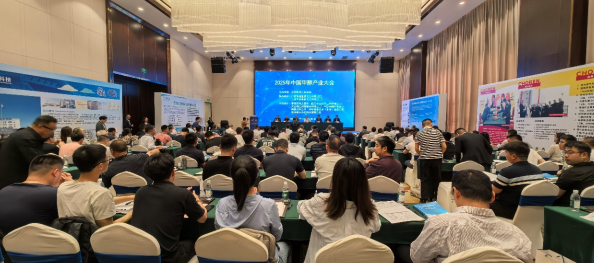The methanol industry has identified five key tasks for this year
On April 23, Gu Zongqin, the chairman of the China Nitrogen Fertilizer Industry Association, pointed out at the 2025 China Methanol Industry Conference held in Qinzhou, Guangxi that the key tasks for the methanol industry this year mainly include strictly controlling the scale of methanol production capacity, accelerating the energy conservation and carbon reduction upgrading and transformation of the methanol industry, and actively promoting the digital and intelligent transformation of the methanol industry. Closely monitor the progress of green methanol innovation practices and actively follow up on five aspects: the construction of the carbon market and the carbon footprint management system.

Gu Zongqin analyzed and believed that in the past two years, the growth rate of methanol production capacity in China has slowed down somewhat, but the production capacity base is already very large, and the consumption of energy and resources is also considerable. In terms of production capacity scale, China's methanol production capacity has reached the target set in the 14th Five-Year Plan by the end of 2024. This year, approximately 7.6 million tons of new production capacity per year is still planned to be put into operation (excluding green methanol). The methanol market has slightly improved. We should be vigilant against redundant construction and homogeneous competition to prevent the industry from falling into a new round of sluggish conditions. The Nitrogen Fertilizer Association calls on local government departments and related enterprises to base themselves on the actual development of their regions, systematically analyze key elements such as resource endowment, ecological environment carrying capacity and market demand, scientifically argue the feasibility and market competitiveness of projects, effectively prevent blind investment and low-level repetitive construction, implement the central government's requirements for comprehensive governance of "intra-industry competition", reduce inefficient internal consumption and stimulate development vitality.
Gu Zongqin emphasized that, based on the national strategic goals of carbon peaking and carbon neutrality, and considering the high energy consumption and high emission characteristics of methanol production, energy conservation and carbon reduction remain the key tasks of the industry at this stage. Enterprises should make full use of the energy-saving experience of advanced enterprises and the innovative achievements of technical units to implement technological upgrading and transformation. Take gasifiers as an example. Currently, the mainstream gasifiers in China have made breakthroughs in the comprehensive utilization of waste heat from waste boiler or semi-waste boiler gas. The stability of the by-product steam and its long-term operation capacity have both passed the assessment and appraisal. In addition, low-energy consumption methanol distillation technology has been constantly innovated, further reducing energy consumption.
When it comes to the digital and intelligent transformation of industries. Gu Zongqin stated that since the beginning of this year, digital technologies represented by Deepseek, such as generative artificial intelligence, computing power infrastructure, and industrial Internet platforms, have been developing at an accelerated rate. This will further accelerate the innovative application of new-generation information technologies in the industrial sector and provide a series of artificial intelligence solutions for enterprises in aspects such as operation and management, production and operation, safety and environmental protection, and emergency command. Strongly support enterprises in achieving "safe, stable, long-term, full and high-quality" production, promote a comprehensive leap in production efficiency and product quality, and accelerate the digital, intelligent development and green and low-carbon transformation of enterprises.
Gu Zongqin pointed out that accelerating the cultivation of the hydrogen industry is an important measure to accelerate the clean and low-carbon transformation of China's energy. With the collaborative efforts of multiple forces, the cost of new energy power generation has dropped rapidly, supporting facilities have gradually matured, and intelligent control systems have been successfully developed. These favorable conditions have made the industrial production of green hydrogen and green methanol, which was once out of reach, soon become a reality. Under such circumstances, traditional methanol enterprises should closely follow the development trends of the green hydrogen and green methanol industries, and actively explore the substitution of clean and low-carbon hydrogen for fossil energy hydrogen in existing processes. Encourage enterprises with the necessary conditions to lay out green methanol projects in advance, seize the opportunity of innovative development, and play a role in the transformation of methanol production from high-carbon to low-carbon processes.
Gu Zongqin pointed out that in accordance with the "Work Plan for Accelerating the Construction of a Dual Control System for Carbon Emissions" issued by The General Office of the State Council in July 2024, relevant departments have already started carbon emission accounting work in key industries. Methanol and synthetic ammonia are typical products in the chemical industry and are also key research objects. To effectively respond to the expansion of the carbon market, enterprises should enhance carbon asset management, establish a complete carbon management system, clarify the division of internal carbon management responsibilities, and closely integrate measures such as optimizing product structure and developing green and low-carbon products with their carbon reduction targets and plans, continuously accelerating the pace of carbon footprint management system construction. To achieve the above goals, at the end of last year, the state initiated a batch of national standards for carbon footprints, including the carbon footprint of methanol products. The Nitrogen Fertilizer Association will also organize industry forces to actively participate in the formulation of standards.
